
Showing Unconditional Love Is NOT the Same as Permissive Parenting: It's all about Beingness
• Get a deep understanding of the permissive parenting style from a reflective, existential point of view that goes beyond observable behavior by looking at Beingness: How everything depends on whether you're parenting from a place of fear vs. parenting from a place of love!
• Get examples of the differences between permissive vs. positive, unconditional parenting.
• These two parenting styles may be said to have similar behavioral parenting traits (like emphasizing freedom, little control and non-punishment) but when looking at Beingness they are entirely different. See their different ways of dealing with conflicts, control, routines and roles!
The Typical Scapegoats of Permissive Parenting:
- "Too Much Love and Too Few Rules!"
Permissive parenting has been proclaimed the curse of modern times by many child rearing experts: 'Children are being spoilt, have lost all sense of decent social behavior and are egoic and bossy beyond reason!'
The problem, many of these parenting experts proceed to proclaim, is that "These children have been given too much love and too few limits and rules!"
Now, let's set one thing straight first:
"Too Much Love" Is Never the Problem!

You can never give your child too much love! That is simply impossible.
True love can never ever be the reason for a child's unhappiness or 'misbehavior'. Think about it, it doesn't really make any sense, does it!
As you probably already know in your heart, unconditional love dissolves the boundaries between you and your child and allows you to feel each other and bond. Love just feels good!
Also nothing heals emotional wounds and low self esteem as efficiently as unconditional love and acceptance.
Unconditional love allows your child to live out his or her inner potentials without fearing your judgment in case of failure.
This full acceptance, or what in the humanist therapy tradition is called the unconditional positive regard is incredibly powerful for fuelling your child's self image and self actualization.
So please, please, please ... let's not make love the scapegoat here! Love is not the problem in permissive parenting.
It never will be!
"Too Few Rules" Is Missing the Main Point, Too! It's all About Beingness!
Unconditional parenting or positive parenting is often misinterpreted as permissive parenting.For the uninitiated observer the unconditional parenting style and permissiveness may look somewhat similar in terms of external behavior style as both parenting styles emphasize personal freedom, few rigid standardized rules, space for choices and warmth and affection.
So what's the difference?
The difference is the parent's BEINGNESS ... the existential place from which the parenting actions come.
Okay, that was a bit lofty perhaps, but please, bear on with me a little longer because I think consistency in Beingness (rather than consistency in rules) is the crux of the matter!
Inconsistency in rules is only a by-product of inconsistency in being and therefore it makes more sense to focus our attention on Beingness.
Beingness comes before everything else!
The Beingness of Love Raises Consciousness While the Beingness of Fear Shuts Everything Down!

When I talk about Beingness in this parenting article, I'll be referring to the two most basic human antagonistic types of Beingness, namely those of love and fear.
Being centred in love expands your consciousness and heightens your awareness.
Everything is easier because love opens you up and allows you to feel and read impulses instantly. You simply know what your child is feeling and how you can help in the best way possible.
When we're stressed or tired or have unresolved inner issues that take up lots of energy, we tend to laps over into a fear mode.
When we are centred in fear our consciousness narrows down significantly and we can't bond with or feel our child. We end up in mental turmoil trying to reason our way out of things or try to follow some established rules because inside we can't feel what is right or wrong. We loose touch with ourselves.
The most important thing for us when we feel like this is surviving the moment. And because our awareness is low, we just tend reproduce old patterns that really don't work.
Possible Reason for Permissiveness No. 1
- Permissive Parents Fear of Not Being Loved!

On a subconscious level I suspect that permissiveness is really grounded in fear:
One typical kind of fear could be the parent's own fear of not being loved. Probably this desire to feel love stems from back his or her own childhood experiences.
In order to feel loved the permissive parent has adopted a pleasing strategy and will do everything in his or her power to please the child, hence no limits, ignoring damaging behavior, avoiding conflicts etc.
Even though it appears that permissive parenting is child-centred (focussing on the child's emotional and existential needs) it does in fact end up being adult-centred:
The pleasing strategy of permissive parenting is an attempt to resolve the parent's own issue of lack of love. It's a strategy to meet his or her own need for feeling love.
Possible Reason for Permissiveness No. 2
- Permissive Parents' Own Fear of Being Deprived of Freedom!
The existential fear of losing freedom and being trapped in routines and rules may also color a permissive parent's parenting strategies.
If a parent has history of feeling deprived of freedom and choice, their parenting strategy may simply be a projective issue imposed on the child.
Therefore the parent is reluctant to impose any restraints on their child because of the feeling that "My child shouldn't have to go through the same things I did!"
Possible Reason for Permissiveness No. 3
- Permissive Parents' Own Fear of Losing Harmony and Peace of Mind!
For some permissive parents the thing they fear the most is conflict with loved ones and hence disrupting harmony and their own peace of mind. They'd much rather go with the flow and even get tread on just as long as conflict is avoided.
Whatever the motive for permissiveness is, it is based in some sort of personal existential fear on way or the other.
(If you recognized your own motives in any of these three scenarios, you may want to try my parenting Enneagram test to learn more about yourself, your strategies and get some parenting tools to help you move closer to your kids).
Parenting From a Place in Fear Makes It about Us - Not Our Child!
We humans are very good at deceiving ourselves. If we think we don't want to get into a conflict because it makes our kid unhappy, we're most likely to be deceiving ourselves.It is US that don't want to feel this unhappiness.
In this way, it's about our OWN need for love, non-conflict or freedom.
When parenting from a place of fear we cannot take our children's needs into account. Fear makes us run on personal survival autopilot trying to satisfy our own needs.
Even though our ego may tell us that we are being selfless, we are in fact only trying to fulfil some unmet need in ourselves.
Ouch!
Unconditional Positive Parenting Is Parenting From a Place of Love!

So how do we know, when we are in a Beingness of love?
Simple:
We are just deeply, deeply present!
We're not thinking, we're not judging, we're not trying to manipulate or control!
We just bond fully with our child.
We feel in our gut or with our instinct what it is our child really needs (as distinct from wants).
We choose actions that are in accordance with what is best in the long run for our child.
This is difficult, I know. Especially if we're tired or stressed!
However, the pure, raw power of deep accepting presence is the KEY. Ignoring, bribing, manipulating and other means of control simply become unnecessary when we are deeply present.
Sometimes your child will have a need for boundaries. But when you're present, you'll feel this and act accordingly. That's the true magic behind presence! You just know stuff!
Therefore I myself have very few pre-set boundaries. They're simply not necessary.
And having only a few boundaries doesn't make my child insecure.
Why?
Because fulfilling basic needs goes before rules!
For instance, my three-year-old child starts getting tired around eight in the evenings and I typically put him to bed at that hour. This means that going to bed at eight each night is not a rule. No, it's a meeting of a need. See the difference.
My strong focus on needs is slowly starting to rub off on my son: He's becoming more and more aware of his needs himself AND is trying to follow them.
He's now very aware of his own needs in terms of: he states that wants to go to bed when he feels he's tired, he asks for my touch when he feels like bonding and he's now slowly discovering the pleasure of helping other people (meeting other people's needs).
Let's Further Adjust the Spotlight to the Difference Between Permissive Parenting and Unconditional Positive Parenting!
Dealing with Conflicts!
Parents practicing permissive parenting may tend to consistently avoid entering conflicts (giving in to their kids) e.g. because of the fear that it will disrupt the peaceful harmony that is so important to them.Parents practicing unconditional parenting also strive to maintain harmony but no at all costs.
To them it's all about entering each situation with an open, flexible mind and putting on the long term spectacles:
For instance, some times the consequences of not entering the conflict (of giving in) are bad for your kid in the long run. Other times, giving in (and maintaining harmony) is preferable because your child really NEEDS what he or she wants and hence in this case there will be no bad long term consequences.
Why this constant scrutiny?
Well, your child's needs change all the time as your child grows and develops (e.g. the need for attention, freedom, authority, security etc.) A flexible mind is therefore the key to accommodate the constantly changing needs of your kid.
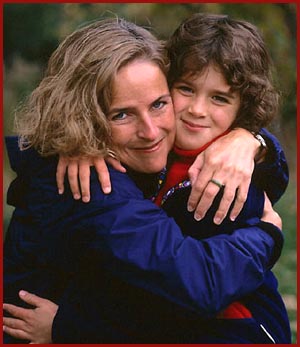
Another thing about conflicts is that often it may just be a way for your child to test or feel you: "Do you still love me even if I'm bad?"
In this case it's not about giving in or not giving in. Then it's only about being there, tuning in and accepting. Your child wants to feel you and your presence and be ensured of you unconditional love.
Therefore your child may be testing limits - but not so much because he or she is looking for external boundaries but because he or she needs to feel YOU.
Your child is wants to feel you as a rock solid parent, fully present and grounded in love and acceptance.
Dealing with Control
It's not that permissive parents don't use control. They do.However, instead of upholding rules they tend to use various forms of 'mild' manipulation. We could call it 'candied' behavior control like using bribes, gifts and perhaps positive reinforcement, praise.
The unconditional parenting style embrace the thought of using as little control as possible, including that of praise and bribes.
According to Alfie Kohn, who as far as I know coined the term unconditional parenting, says that every form of control is a 'doing to' your child in order to get your child to do what you want.
Even praise is a behavior control technique because the parent is using a child's need for parenting affection to get his child to obey.
Alfie Kohn recommends us to 'work with' our child instead.
It's about sensing what your child needs and working 'with it' rather than against it:
E.g. the futile attempt to force boiled vegetables into your kid (trying to fulfil a basic need for greens - a 'doing to') vs. transforming the greens into a delicious lasagne or vegetable sauce that your kid will love (trying to fulfill a need for greens by 'working with').
Dealing with Routine
Typically permissive parents tend to have very few routines either because they don't want to impose their own ideas onto their child or because they are spontaneous and embrace living in the moment.Once again, it's not a question of having routines or not.
It's a question of needs. Unconditional positive parenting is about bringing routine into everyday life if it is required ... when and if the child needs it.
E.g. my child loves routine patterns certain days and then wants to do something completely different some other days.
Typically he prefers routine if he's a bit tired and don't have much energy. He can then relax in what he knows. Routines give him security!
Other days he's more explorative and needs new stimulation. His needs vary all the time.
Once again, tapping in to the Beingness of love to feel your kid and raising your awareness to make good, long term decisions is the key!
Dealing with Parenting Roles
 In their attempt to have peaceful relations, many permissive parents tend to let their kid walk right over them.
In their attempt to have peaceful relations, many permissive parents tend to let their kid walk right over them.
In this way they unintentionally show their children that it's okay not to respect other people's limits.
Basically not respecting yourself and your limits as a parent is doing your child a huge disservice.
On the other hand, it's not so much about being a fearful authority either.
No, it's much more subtle.
It's about being an empowering guide. Being that which you want your children to learn.
Instead of either yelling at or ignoring tantrums, you help your child find out what it is he or she needs. Because the tantrum (crying or yelling) is just an expression of something else, a need!
Your job is to help your child meet those basic existential, emotional and physicals need until your child can take over and do it himself or herself.
Out of all my advice and suggestions my one main message is:
Your deep presence has more power than all the rules in the world!
Why?
When you're present, you raise your awareness and you know what is right and what to do!
It really doesn't get any simpler than that.
This is the end of this parenting article on permissive parenting. I hope it was of use to you. You can find other articles on permissive parenting and other parenting styles down below.
Your Positive Parenting Ally,
Birgitte

Want to stay in touch and get the latest news?
Sign up
for my free newsletter
Parent Coaching
- For Inner Peace, Clarity and a Deeper Connection to Your Child
 Being a parent can feel like a double-edged sword. Life with kids may feel like the greatest gift you have ever received, while at the same being hugely challenging, often leaving you confused, stressed and overwhelmed.
Being a parent can feel like a double-edged sword. Life with kids may feel like the greatest gift you have ever received, while at the same being hugely challenging, often leaving you confused, stressed and overwhelmed.
When we feel like this, we've lost touch with ourselves. We can't hear our own inner voice, and it's difficult to know what is 'right' for us and how to act.
I offer in-depth parent coaching to help you regain your balance and get back in touch with yourself. From a place of inner peace and clarity, your will find your own answers which will help you reconnect with your child from a place of unconditional love and acceptance.
Read more about my parent coaching here.
Where Would You Like to Go Next?
Go to the 'Mother Page' of These Parenting Articles
 Tracing Diana Baumrind's Parenting Styles Through History! Unravelling the Essence of the Dominant Parenting Paradigms of the Western World |
Articles on Diana Baumrind's 3 Parenting Styles
 Diana Baumrind's 3 Styles of Parenting: Get a Full Understanding of Baumrind's 3 Archetypical Parents. |
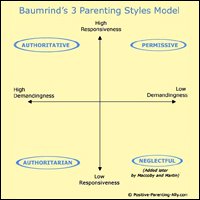 The Four Basic Styles of Parenting Taken a Step Further: Reviewing Diana Baumrind's Model with the Tool of High Awareness. |
Articles on the Authoritarian Parenting Style
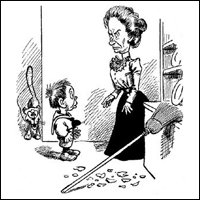 A Fascinating Historical View on the Authoritarian Parenting Style Along with Deep Insights into Authoritarian Parents' Thought Pattern and Its Effect on Their Kids. |
 A Psychological Profile on Authoritarian Parents! Understanding the Authoritarian Personality from Within! |
 The Essence of the Authoritarian Parenting Style and the Long Term Effects of Strict Parenting! |
Articles on the Permissive Parenting Style
 A Psychological Profile on 3 Types of Permissive Parents: Understand Their Indulgent Behavior by Understanding Their Ego Fears! |
 Understanding the nature of the permissive parenting style: Going beyond Diana Baumrind's idea of low demandingness and get deep insights into the psychology of permissive parents. |
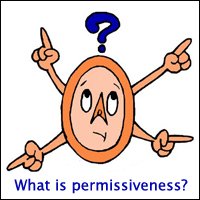 Permissive Parenting Historically and Psychologically: The Rise of 'Permissive' Parenting and the 3 Fear Based Indulgent Parenting Strategies! |
Articles on the Authoritative Parenting Style
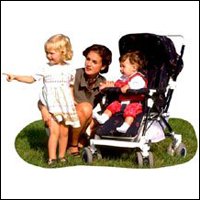 Deep Insights into the Authoritative Parenting Style along with Modern Perspectives on Diana Baumrind's Beloved 'Firm Parental Control'! |
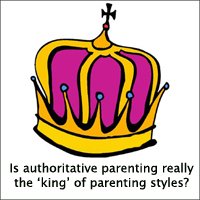 Academic Criticism of the Authoritative Parenting Style: Questioning Diana Baumrind's Celebration of High Control! |
Back to the top of this page about Showing Unconditional Love Is NOT the Same as Permissive Parenting: It's all about Beingness
Go to the Positive Parenting Ally Homepage







